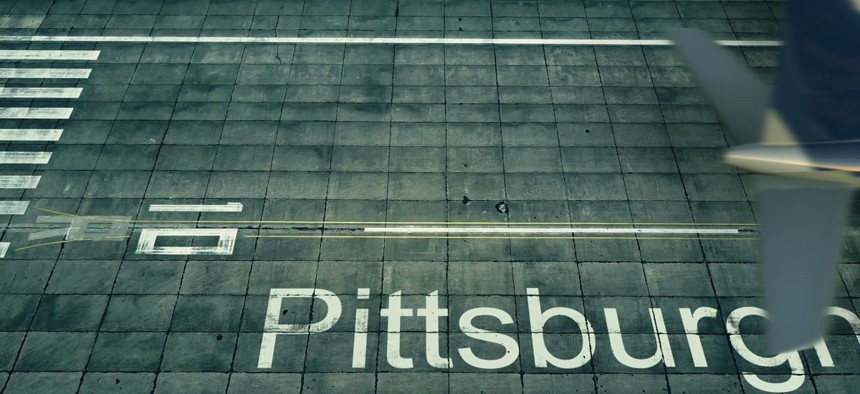Pittsburgh Airport Partnership Will Create Testing Ground for New Technology

Pittsburgh International Airport
Artificial intelligence could soon make its way into the aviation space through a collaboration with Carnegie Mellon University.
The Allegheny County Airport Authority and Carnegie Mellon University reached an agreement Thursday allowing the school to deploy new technologies that will help modernize Pittsburgh International Airport.
ACAA CEO Christina Cassotis was brought in a little more than three years ago “to see if more could be done for a hub that was no longer a hub” after now-defunct U.S. Airways downsized, leaving some concourses vacant.
A $1.1 billion Terminal Modernization Program—which will relocate the Landside Terminal and related ground-side functions to a new facility adjacent to the Airside Terminal—breaks ground next year with the goal of being fully operational by 2023. And ACAA is in the process of selecting technologies that will boost efficiency at check in, ticketing, security and baggage claim, Cassotis said.
“We’re not trying to be a hub anymore,” she added. “We are trying to be a good origin and destination market.”

That’s where CMU’s Metro21: Smart Cities Institute is expected to come in, per the new partnership, with cutting-edge tech like artificial intelligence improving everything from traveler flow to access for those with disabilities.
For three years, the university and airport have already partnered on accessibility and inclusion projects like a mobile application, developed by the Traffic21 Institute, that conveniently directs drivers to empty parking closest to terminal entrances.
CMU’s Heinz College has analyzed the flow of travelers through the airport to aid those with reduced mobility.
Meanwhile, the Cognitive Assistance Lab has piloted NavCog—step-by-step, smartphone-based navigation for people with visual impairments that relies on Bluetooth low-energy beacons throughout the airport.
"Pittsburgh International Airport plays a critical role in our economy and shares our vision for making the Pittsburgh region a model for communities across the world,” CMU President Farnam Jahanian said in the announcement. “This agreement will help our Metro21 Institute to continue and expand data-driven projects in a real-world setting.”
Due to previous collaborations, there’s already a process in place whereby CMU faculty and students propose potential innovations to ACAA’s team of aviation experts for vetting. If the tech CMU proposes solves something the authority agrees is a problem, then it works to pull the needed resources together.
ACAA already collects impersonal data on parking, shopping and web traffic that Metro21 could merge with predictive analytics. And CMU happens to be the leading school in the world for AI, Cassotis said.
“We’re looking for where that can be applied in an airport setting that makes sense,” she said. “I don’t know what that looks like.”
“Were at the beginning, but having a partner like CMU and a real-world ability to test R&D is really exciting in the aviation space.”
Dave Nyczepir is a News Editor at Government Executive’s Route Fifty and is based in Washington, D.C.
NEXT STORY: What Cities Need to Know About Chatbots and Data Security






